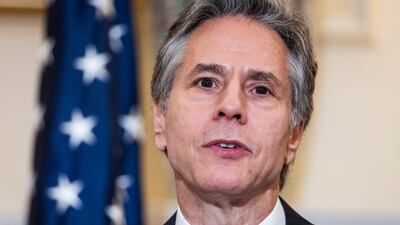US Secretary of State Antony Blinken and Saudi Arabia's Foreign Minister Prince Faisal bin Farhan have spoken about the kingdom's efforts to extend a truce in Yemen.
During a telephone call, the pair also "discussed efforts to avoid the economic, environmental and humanitarian threats posed by the Safer oil tanker in the Red Sea region", the US Embassy in Saudi Arabia tweeted on Tuesday.
The UN is trying to raise funds to replace the ageing oil tanker moored off the coast of Yemen in the Red Sea, which could spill millions of barrels of oil into the sea unless urgent action is taken. The Houthis have for years blocked access to the vessel and the unloading of the cargo on board, but recently agreed to the UN plan to obtain a new floating storage platform.
A two-month ceasefire took effect on April 2, at the start of Ramadan and has largely held despite what the Yemeni government says are Houthi breaches. But the deal is set to expire in a few days unless an agreement is reached to extend it.
Both the government in Aden and the Iran-backed Houthi rebels have said they are keen to extend the two-month agreement.
The two officials also discussed the challenge posed by Iran's nuclear programme and Tehran's destabilising activities in the region, as well as opportunities for increased co-operation on regional issues, the embassy said.
They also touched on the war in Ukraine, as well as the need for a global response to the food security crisis.
US Special envoy for Yemen Tim Lenderking told The National last week that Washington is “cautiously optimistic” about extending the truce.
“There really is a big drop in fighting. No cross-border attacks … the truce provides the best chance that Yemen has had since this conflict began to really turn a corner to end the violence," he said.
Since the truce began, civilian casualties have halved and officials within the Yemeni government as well as in the Saudi-led coalition have expressed their keenness on extending the cessation of hostilities.
The first major result of the ceasefire was the departure of the first flight from rebel-held Sanaa since the war began over five years ago. The second step, a discussion on ending the Houthi blockade around the city of Taez was delayed but took place late last week. Further flights are expected from Sanaa in the coming days.
UN envoy Hans Grundberg said the truce has had a “considerable positive impact on the daily lives of many Yemenis".
The Saudi-led coalition intervened in the war in March 2015 at the request of the internationally recognised government led by former President Abdrabu Mansur Hadi.
Mr Hadi stepped down in April to make way for a presidential council created after discussions between Yemeni stakeholders, in Riyadh. The Houthi rebels rejected the choice of venue and refused to take part.

